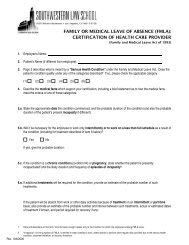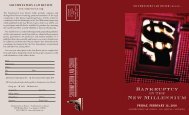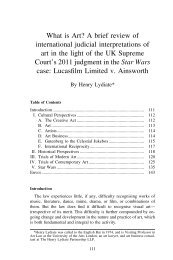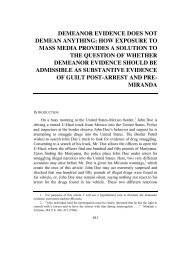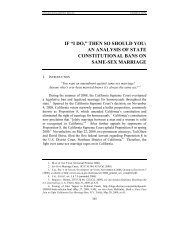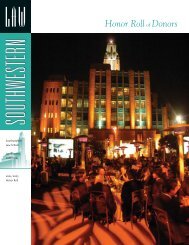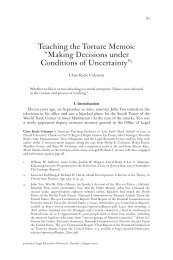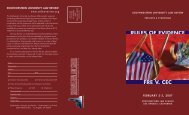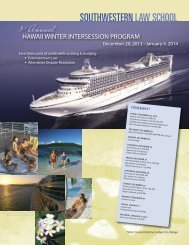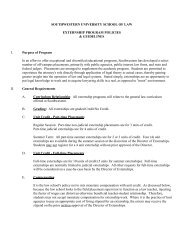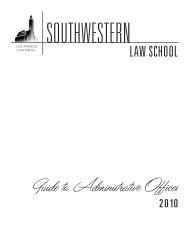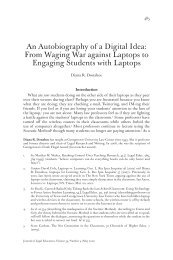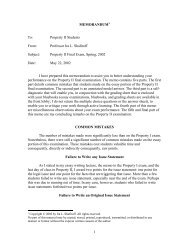What Does Balance in Legal Education Mean? - Southwestern Law ...
What Does Balance in Legal Education Mean? - Southwestern Law ...
What Does Balance in Legal Education Mean? - Southwestern Law ...
You also want an ePaper? Increase the reach of your titles
YUMPU automatically turns print PDFs into web optimized ePapers that Google loves.
107SymposiumForeword: <strong>What</strong> <strong>Does</strong> <strong>Balance</strong><strong>in</strong> <strong>Legal</strong> <strong>Education</strong> <strong>Mean</strong>?Bruce J. W<strong>in</strong>ickThe Association of American <strong>Law</strong> Schools granted provisional status<strong>in</strong> June, 2007 to the Section on <strong>Balance</strong> <strong>in</strong> <strong>Legal</strong> <strong>Education</strong>. <strong>What</strong> are theobjectives of this newest AALS section and what were its orig<strong>in</strong>s? The sectiontraces its roots to a listserv started by Professor Larry Krieger of the FloridaState University <strong>Law</strong> School <strong>in</strong> 1999. The Humaniz<strong>in</strong>g <strong>Legal</strong> <strong>Education</strong>Listserv quickly attracted a few hundred law faculty to discuss the state oflegal education, the well-be<strong>in</strong>g of law students and lawyers, and potentialimprovements that might be made. The listserv apparently met a need forquestion<strong>in</strong>g some of the approaches, values, and <strong>in</strong>stitutions of legal education,and has emerged as a lively discussion group.Almost immediately listserv members began to organize programs witha humaniz<strong>in</strong>g legal education theme, and they persuaded exist<strong>in</strong>g AALSsections to sponsor them at established meet<strong>in</strong>gs. The group also beganhold<strong>in</strong>g <strong>in</strong>formal organizational meet<strong>in</strong>gs at each AALS annual meet<strong>in</strong>g.The first, “Propos<strong>in</strong>g a Humaniz<strong>in</strong>g Dimension for <strong>Legal</strong> <strong>Education</strong>,” washeld at the 2000 AALS Annual Meet<strong>in</strong>g. Additional such programs <strong>in</strong>cluded“<strong>Law</strong> Student Depression” (2003); “Values, Needs, Integrity, and TheirImpact on Attorney and <strong>Law</strong> Student Depression” (2004); and “Teach<strong>in</strong>gProfessionalism <strong>in</strong> the <strong>Law</strong> School Classroom” (2006). Moreover, Humaniz<strong>in</strong>g<strong>Legal</strong> <strong>Education</strong> Listserv members have participated <strong>in</strong> a number ofprograms held by other organizations. These <strong>in</strong>cluded “Mak<strong>in</strong>g <strong>Law</strong> SchoolTherapeutic for <strong>Law</strong> Students” (2 nd International Conference on TherapeuticJurisprudence, University of C<strong>in</strong>c<strong>in</strong>nati College of <strong>Law</strong>, 2001); “PsychologicalInsights: Address<strong>in</strong>g the ‘Professionalism’ Problem <strong>in</strong> the First Year of <strong>Law</strong>School” (Annual Conference of the Association of <strong>Legal</strong> Writ<strong>in</strong>g Directors,M<strong>in</strong>neapolis, 2001); “Teach<strong>in</strong>g Health, Satisfaction and Professionalism <strong>in</strong>Bruce J. W<strong>in</strong>ick is the Silvers & Rubenste<strong>in</strong> Dist<strong>in</strong>guished Professor of <strong>Law</strong> at the Universityof Miami School of <strong>Law</strong>, a Professor of Psychiatry and Behavioral Sciences at the University ofMiami School of Medic<strong>in</strong>e, and chair of the AALS section on <strong>Balance</strong> <strong>in</strong> <strong>Legal</strong> <strong>Education</strong>. Thissymposium is a project of the Scholarship Subcommittee of that section, and I am grateful toSusan Daicoff, its chair, and to committee members Rhonda Magee, Robert Schuwerk, D’LorahHughes, Josh Rosenberg, and Larry Krieger for their efforts and helpful comments on thisForeword.Journal of <strong>Legal</strong> <strong>Education</strong>, Volume 60, Number 1 (August 2010)
108 Journal of <strong>Legal</strong> <strong>Education</strong>the Externship Classroom Component” (Conference on <strong>Legal</strong> Externships,Catholic University <strong>Law</strong> School, 2003); “Professionalism and PersonalSatisfaction” (Conference on Cl<strong>in</strong>ical <strong>Legal</strong> <strong>Education</strong>, Vancouver, 2003);“Active Teach<strong>in</strong>g to Develop <strong>Law</strong> Student Values and Career Direction”(Annual Conference of the Institute for <strong>Law</strong> School Teach<strong>in</strong>g, GonzagaUniversity <strong>Law</strong> School, 2004); “Changes <strong>in</strong> Values and Motivation Among<strong>Law</strong> Students: a Model for Empirical Evaluation of Undergraduate ValuesTra<strong>in</strong><strong>in</strong>g” (Institute for College Student Values Annual Conference, FloridaState University, 2005); “Guid<strong>in</strong>g Students to Satisfy<strong>in</strong>g <strong>Legal</strong> Careers:New Empirical Evidence” (National Association for <strong>Law</strong> Placement AnnualConference, Chicago, 2005); and many others.In late 2004, Professor Krieger and others <strong>in</strong>volved <strong>in</strong> this effort decidedto form the Humaniz<strong>in</strong>g <strong>Legal</strong> <strong>Education</strong> Association, with an ExecutiveBoard to more effectively organize the activities of the grow<strong>in</strong>g <strong>in</strong>terest group.Self-nom<strong>in</strong>ations were taken for the board and <strong>in</strong> December 2004, the listservparticipants elected a ten-member executive board which began to organizeactivities.In 2006, a pivotal year, at the suggestion of Professor Ann Iijima of WilliamMitchell School of <strong>Law</strong>, the AALS sponsored a full-day “Workshop on <strong>Balance</strong><strong>in</strong> <strong>Legal</strong> <strong>Education</strong>” as part of its Annual Meet<strong>in</strong>g. The topics co<strong>in</strong>cided withthe <strong>in</strong>terest areas of the Humaniz<strong>in</strong>g Association and many organizationmembers served as speakers and discussants. The workshop attracted morethan 300 attendees and generated its own momentum for both dialogue aboutlegal education and the ultimate formation of a related section. In response tothe robust attendance at the <strong>Balance</strong> workshop, the board of the Humaniz<strong>in</strong>gAssociation determ<strong>in</strong>ed to immediately proceed with the section petition.After much debate, the board decided that the new section should notfeature “humaniz<strong>in</strong>g legal education” <strong>in</strong> its name. We felt that language couldbe easily misunderstood, might be off-putt<strong>in</strong>g to some, and also might betoo narrow <strong>in</strong> light of the many potential reforms that could improve legaleducation. The board, <strong>in</strong>stead, adopted the broader title of the recent AALSworkshop, and proposed the Section on <strong>Balance</strong> <strong>in</strong> <strong>Legal</strong> <strong>Education</strong>. Theboard submitted its petition <strong>in</strong> February, 2006; provisional section status wasgranted by the AALS <strong>in</strong> June, 2007.The section presented programs at the 2007 and 2008 AALS annualmeet<strong>in</strong>gs. At the 2007 AALS Annual Meet<strong>in</strong>g, the proposed section presented“<strong>Balance</strong> <strong>in</strong> <strong>Legal</strong> <strong>Education</strong>, One Year Later.” The 2008 program, entitled“<strong>What</strong> <strong>Does</strong> ‘<strong>Balance</strong> <strong>in</strong> <strong>Legal</strong> <strong>Education</strong>’ <strong>Mean</strong>?,” attracted an audience of117. The room capacity was 70; overflow crowd stood along the walls and <strong>in</strong>the center aisle. The program sought to create a dialogue about the potentialways <strong>in</strong> which legal education might be improved by <strong>in</strong>creas<strong>in</strong>g “balance” <strong>in</strong> avariety of doma<strong>in</strong>s of <strong>in</strong>terest to the speakers.
Balanc<strong>in</strong>g Symposium: Forward109“<strong>Balance</strong>” <strong>in</strong> legal education is an <strong>in</strong>tentionally broad term with numerouspotential applications to an educational enterprise. The title is a Rorschach,a projection test, <strong>in</strong>vit<strong>in</strong>g people from differ<strong>in</strong>g perspectives to exam<strong>in</strong>e themany aspects of legal education and to the extent they seemed unbalanced,to th<strong>in</strong>k creatively about how that balance could be restored. The programconsisted of presentations by a number of law school deans followed bycomments by several law students. Discussion among audience memberscont<strong>in</strong>ued <strong>in</strong> the hallways after the session was over.Because the program was not recorded, we <strong>in</strong>vited each of the law schooldeans and students who had participated <strong>in</strong> the annual meet<strong>in</strong>g program tocontribute a short essay on “<strong>What</strong> <strong>Balance</strong> <strong>in</strong> <strong>Legal</strong> <strong>Education</strong> <strong>Mean</strong>s to Me.”Happily, most of the deans and a panelist uniquely suited to represent thestudent voice could recreate their thoughts for this issue. The m<strong>in</strong>i-symposiumthat follows captures the spirit and thoughtfulness of the oral presentationsmade at the annual meet<strong>in</strong>g.In what ways can legal education be thought of as be<strong>in</strong>g out of balance andhow can balance be restored <strong>in</strong> each such area? Rais<strong>in</strong>g these questions is themission of the Section on <strong>Balance</strong> <strong>in</strong> <strong>Legal</strong> <strong>Education</strong>. We seek to hold a mirrorto the legal academy and call for a broad re-exam<strong>in</strong>ation of all aspects of legaleducation. We justly pride ourselves on the many virtues of a legal education—its sharpen<strong>in</strong>g of conceptual and communicative skills, its preparation ofstudents for professional life, its rigors and its pleasures. Yet, many questionscan be raised about its basic approaches to teach<strong>in</strong>g, test<strong>in</strong>g, and socialization<strong>in</strong>to professional life. Do we adequately prepare our students to be the lawyersthey soon will be? Do exist<strong>in</strong>g practices strip away the values and idealismthat many of our students brought with them to law school? Can emerg<strong>in</strong>gtechniques of teach<strong>in</strong>g and learn<strong>in</strong>g be adapted to replace or augment thetraditional case method and Socratic approaches that still predom<strong>in</strong>ate <strong>in</strong> lawschool? <strong>Does</strong> law school produce more anxiety and stress <strong>in</strong> our students thanis necessary or advisable? <strong>Does</strong> it provide sufficient opportunities for studentsto exercise autonomy over curricular and other matters? <strong>Does</strong> it contributeto the depression and dissatisfaction that many of our students and youngprofessionals experience?These are just some of the questions that our section on <strong>Balance</strong> <strong>in</strong> <strong>Legal</strong><strong>Education</strong> seeks to raise. The answers will vary widely, of course. The essaysthat follow reflect the thoughtful viewpo<strong>in</strong>ts of several law school deans andone former student. We offer these essays <strong>in</strong> the spirit of stimulat<strong>in</strong>g furtherdialogue and debate about legal education and how it can be improved.



